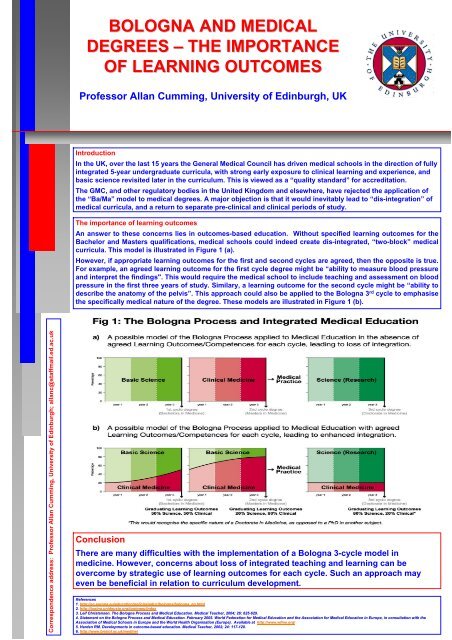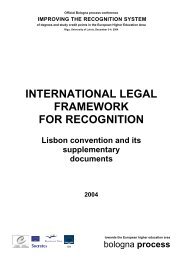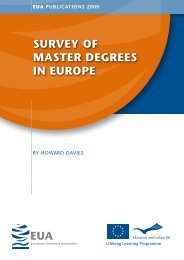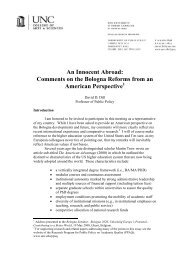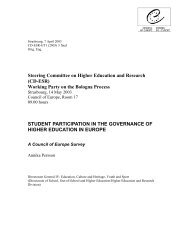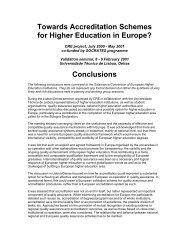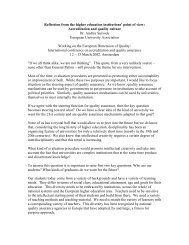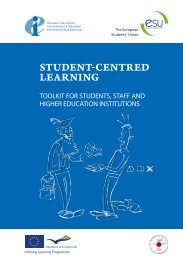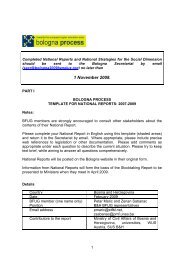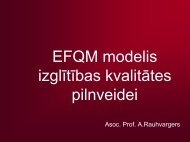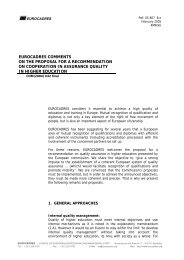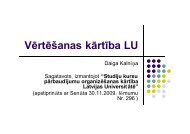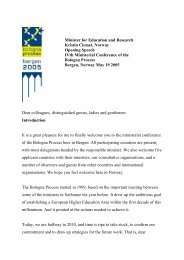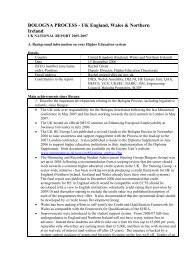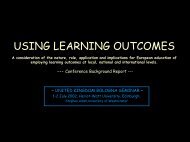BOLOGNA AND MEDICAL DEGREES – THE IMPORTANCE OF ...
BOLOGNA AND MEDICAL DEGREES – THE IMPORTANCE OF ...
BOLOGNA AND MEDICAL DEGREES – THE IMPORTANCE OF ...
Create successful ePaper yourself
Turn your PDF publications into a flip-book with our unique Google optimized e-Paper software.
Correspondence address: Professor Allan Cumming, University of Edinburgh; allanc@staffmail.ed.ac.uk<br />
<strong>BOLOGNA</strong> <strong>AND</strong> <strong>MEDICAL</strong><br />
<strong>DEGREES</strong> – <strong>THE</strong> <strong>IMPORTANCE</strong><br />
<strong>OF</strong> LEARNING OUTCOMES<br />
Professor Allan Cumming, University of Edinburgh, UK<br />
Introduction<br />
In the UK, over the last 15 years the General Medical Council has driven medical schools in the direction of fully<br />
integrated 5-year undergraduate curricula, with strong early exposure to clinical learning and experience, and<br />
basic science revisited later in the curriculum. This is viewed as a “quality standard” for accreditation.<br />
The GMC, and other regulatory bodies in the United Kingdom and elsewhere, have rejected the application of<br />
the “Ba/Ma” model to medical degrees. A major objection is that it would inevitably lead to “dis-integration” of<br />
medical curricula, and a return to separate pre-clinical and clinical periods of study.<br />
The importance of learning outcomes<br />
An answer to these concerns lies in outcomes-based education. Without specified learning outcomes for the<br />
Bachelor and Masters qualifications, medical schools could indeed create dis-integrated, “two-block” medical<br />
curricula. This model is illustrated in Figure 1 (a).<br />
However, if appropriate learning outcomes for the first and second cycles are agreed, then the opposite is true.<br />
For example, an agreed learning outcome for the first cycle degree might be “ability to measure blood pressure<br />
and interpret the findings". This would require the medical school to include teaching and assessment on blood<br />
pressure in the first three years of study. Similary, a learning outcome for the second cycle might be “ability to<br />
describe the anatomy of the pelvis”. This approach could also be applied to the Bologna 3rd cycle to emphasise<br />
the specifically medical nature of the degree. These models are illustrated in Figure 1 (b).<br />
Conclusion<br />
There are many difficulties with the implementation of a Bologna 3-cycle model in<br />
medicine. However, concerns about loss of integrated teaching and learning can be<br />
overcome by strategic use of learning outcomes for each cycle. Such an approach may<br />
even be beneficial in relation to curriculum development.<br />
References<br />
1. http://ec.europa.eu/education/policies/educ/bologna/bologna_en.html<br />
http://ec.europa.eu/education/policies/educ/bologna/bologna_en.html<br />
2. http://tuning.unideusto.org/tuningeu/index<br />
http:// tuning.unideusto.org/tuningeu/index<br />
3. Leif Christensen. The Bologna Process and Medical Education. Medical Teacher, 2004; 26: 625-629. 625 629.<br />
4. Statement on the Bologna Process and Medical Education. February February<br />
2005. World Federation for Medical Education and the Association Association<br />
for Medical Education in Europe, in consultation with the<br />
Association of Medical Schools in Europe and the World Health Organisation Organisation<br />
(Europe). Available at http://www.wfme.org<br />
http:// www.wfme.org/<br />
5. Harden RM. Developments in outcome-based outcome based education. Medical Teacher, 2002; 24: 117-120. 117 120.<br />
6. http://www.bristol.ac.uk/medine<br />
http:// www.bristol.ac.uk/medine/
Correspondence address: Dept of Medical Education University Medical Centre Groningen PO Box 30.001 9700 RB Groningen The Netherlands<br />
G2010<br />
A competence based medical<br />
BaMa curriculum<br />
Jan B.M. Kuks Jan C.C. Borleffs<br />
Curriculumdirector Dean of Education<br />
University Medical Centre Groningen, The Netherlands<br />
Introduction<br />
In spite of the fact that delegates of many countries signed a Joint<br />
Declaration on the European Higher Education Area (Bologna 1999) there is<br />
still a considerable diversification regarding the structure of medical<br />
curricula. This may be because the medical curriculum cannot be<br />
compared in all aspects with other university studies but unfamiliarity and<br />
indistinctness may play a considerable hampering role.<br />
Concept<br />
In 2003 we started a new<br />
problem based medical<br />
curriculum with a 3-year<br />
Bachelor’s and a 3-year<br />
Master’s program, aimed at<br />
year classes of 440<br />
students.<br />
A one year graduate entry<br />
program was demanded to<br />
allow students with degrees<br />
in areas related to medicine<br />
to enter the Master<br />
Result<br />
The Groningen Medical<br />
Curriculum G2010 is a<br />
prototype of an integrated<br />
curriculum following the<br />
Bologna two-cycle system.<br />
Featuring are competencies<br />
adapted from CanMEDs for<br />
basic medical education.<br />
The graduate entry program<br />
has a yield of<br />
nearly 100%. By now it is<br />
premature to make a<br />
statement about students<br />
leaving before getting their<br />
medical degree.<br />
Theory<br />
Training<br />
B1<br />
B2<br />
B3<br />
Professional<br />
Orientation<br />
M1<br />
Clerkship<br />
M2<br />
Elective<br />
M3<br />
Professional<br />
Development<br />
The G2010 Curriculum<br />
Bachelor program<br />
Master program<br />
B1.1&B1.4 Medical processes<br />
B1.2&B1.3 Cell biology and Physiology<br />
B2.1&B2.2 Brain and Senses<br />
B2.3&B2.4 Internal Medicine<br />
B3.1&B3.2 Surgery and Acute Medicine<br />
B3.3&B3.4 Life Cycle<br />
M1-4 M1 4 Dual training: skills lab&clerkship<br />
M2 10-12 10 12 4 week clerkships<br />
M3 Elective clinical clerkship<br />
Scientific clerkship<br />
130<br />
Selection<br />
LOGO/Picture<br />
Bachelor related to<br />
medicine<br />
Graduate entry program<br />
7 central competencies<br />
• Communication<br />
• Clinical Problem Solving<br />
• Applying Knowledge &<br />
Science<br />
• Clinical Skills<br />
• Patient management<br />
• Using Social &<br />
Community context<br />
• Reflection<br />
Conclusion<br />
Building a 2 cycle BaMa curriculum is really<br />
possible. If learning objectives are welldefined<br />
in Ba- and Ma- blueprints, ‘only’<br />
language related obstacles remain in<br />
exchange programs for medical students.<br />
Students with degrees in other areas will<br />
need a one year program before getting in.<br />
2-cycle cycle BaMa is a challenge to be taken up<br />
?<br />
?<br />
?<br />
?<br />
?<br />
410<br />
35<br />
35
Korrespondenzadresse:<br />
Jerome Rotgans, Ph.D., D.D.S., M.D., M.H.P.E. - Professor of Dental Medicine / Health Professions Educationalist<br />
Medical Faculty – Clinic for ZPP, Aachen University, 52057 Aachen/Germany<br />
phone/fax.: 0241.8088-733 / 8082-468; mobil: 0171.6254431; e-mail: jrotgans@ukaachen.de<br />
A TRAINING <strong>AND</strong> EDUCATION<br />
CONTINUUM FOR DENTISTRY<br />
– A <strong>BOLOGNA</strong> ORIENTED CONCEPT –<br />
Rotgans J*, Lampert F**<br />
RWTH Aachen University, Medical Faculty, Aachen/Germany<br />
*) Health Professions Educationalist; **) Chair Working Group ‘Dental Education’<br />
The Bologna Declaration 1999 - Recommendations<br />
� promotion of European dimensions in higher education<br />
� harmonization in the duration and framework of titles<br />
– adoption of a system of easily readable and comparable degrees<br />
� adoption of a system based on three cycles:<br />
– undergraduate (bachelor)<br />
– postgraduate (master and doctorate)<br />
Considerations – general<br />
� Political ‚inspirations‘<br />
– shortage of dentists (and doctors) soon?<br />
– no need for dentists (and doctors) to become master (∼15% only)?<br />
– drop-out/burn-out rates too high<br />
– education and training (too) expensive<br />
� Knowledge growth in medicine vs. its detoriation: half-valuetime<br />
∼ 3-5 years but what half stays actual? � don‘t train<br />
undergraduate students (too long) on an obsolete knowledge<br />
base!<br />
� Academic education and training = adult learning, i.e. from<br />
behaviorism to constructivism = allowing students to learn<br />
� development of self-responsible personalities, i.e. lifelong<br />
learners � 3 cycles?<br />
<strong>THE</strong> DUTCH IMPULSE [TMO]<br />
Medical Training and Education Continuum<br />
Doctor‘s<br />
License<br />
Master of Medicine<br />
3 years<br />
Bachelor of Medicine<br />
3 years<br />
sec. school<br />
sc. education<br />
Doctor‘s<br />
License<br />
Master of Medicine<br />
Master of Medicine<br />
4 4 years<br />
selection<br />
other bachelor<br />
3 years<br />
sec. school<br />
sc. education<br />
Bachelor of<br />
Polytechnics<br />
(4 years)<br />
or<br />
training abroad<br />
sec. school<br />
sc. or gen. educ.<br />
Aachen Considerations<br />
� Make students more EU-competible!<br />
� A tri-semester re-structure of the existing<br />
curriculum à 14 weeks makes<br />
– the curriculum full year academic<br />
– ‘bachelor-proof’<br />
without loss of any the actual competences<br />
� The 3-year bachelor - as “preliminary licensed<br />
dentist” according to § 13 Dental Licensed<br />
Act – is employable<br />
� 2 years of combined present and distant<br />
learning – in an interim-cycle - towards full<br />
licensure (§ 2 DLA) in satellites include full<br />
NHS licensure<br />
� This 5-year curriculum meets EU-directives<br />
� Additional training and education is up to<br />
individual’s life-planning and responsibility<br />
Cycle 3<br />
Cycle 2<br />
� adoption of an uniform credit system<br />
– generalization of the European Credit Transfer System<br />
� promotion of cooperation in quality assurance<br />
– increase in quality of education (assessments, accreditation)<br />
� promotion of mobility of students and teachers<br />
� life-long learning and training using new technologies<br />
Considerations – special*<br />
� Entrance age of students high in regard to European fellowcompetitors<br />
� NHS license only to acquire after 2 years introduction in<br />
contracted NHS-practises but no need for that for European<br />
fellow-competitors<br />
� Annual bi-semester structure à 14 weeks only<br />
� The total restorative training (Cons & Prosth) = 11 weeks �<br />
Academic Counsel’s Recommendation a.o. additional<br />
training in contracted academic Satellite Dental Offices<br />
� Trend for master qualifications as specialisation (postgraduate<br />
training)<br />
AACHEN DENTAL TRAINING <strong>AND</strong><br />
EDUCATION CONTINUUM DESIGN<br />
National<br />
Interim-Cycle<br />
Interim Cycle<br />
Cycle 1<br />
Doctor of Philosophy<br />
Master of Science<br />
2 years<br />
(academic)<br />
= Bologna-Track<br />
Full Dental License (§ 2 ZHG) (Basic Dentist)<br />
NHS-Preparation Time<br />
(under full academic supervision)<br />
2 years<br />
- Scientific Counsil`s advice -<br />
Preliminary Dental License (§ 13 ZHG)<br />
Bachelor of<br />
DentalScienc<br />
3 years<br />
(auto)selection<br />
after 1 year<br />
Bachelor of<br />
Dental Science<br />
2 years<br />
other bachelor<br />
3 years<br />
The Aachen Dental Training and Education Continuum Design<br />
– meets the Bologna Recommendations, and<br />
– is a model for a Medical Training and Education Continuum<br />
selection<br />
selection<br />
Master of<br />
Dental Science<br />
2 years<br />
(professional)<br />
Selection for specialisation<br />
sec. school<br />
sc. education<br />
selection<br />
sec. school<br />
sc. education<br />
selection<br />
Dr.med.dent.<br />
Doctor of Dental<br />
Science<br />
Bachelor of<br />
Polytechnics<br />
(4 years)<br />
or<br />
training abroad<br />
sec. school<br />
sc. or gen. educ.<br />
*) Aachen view
Correspondence address:<br />
Dr Geoffrey Chadwick, Clinical Skills Centre, School of Medicine and Medical Science,UCD Dubiin 4 Ireland<br />
Modular Structure at<br />
UCD School of Medicine &<br />
Medical Science<br />
Dublin, Ireland<br />
Dr Geoffrey Chadwick, Dr Jason Last<br />
UCD School of Medicine and Medical Science Teaching and Learning Team<br />
Medicine Programme Outline<br />
1) Six year undergraduate curriculum:<br />
- School leavers and mature entrants<br />
- Exemption from first year on the basis<br />
of strength in laboratory sciences<br />
- Soon to require HPAT (National Aptitude Test)<br />
2) GEM Programme<br />
- Four year graduate entry to medicine<br />
- Honours (2:1) level 8 primary degree and GAMSAT<br />
Modular and Semester Based Programme<br />
• A typical undergraduate Stage in UCD is two semesters - one year (see above). This is<br />
represented in the following figure; six modules, each worth 5 credits, run in parallel<br />
within each of two semester. Student have elective choices of 35 credits.<br />
Six Year Undergraduate Programme<br />
• Stages One to Four have six modules per semester and 5 ECTS type credits per<br />
module (30 credits per semester and 60 credits per stage).<br />
• Stage One: Scientific basis for medicine<br />
• Stage Two: Introduction to molecules, cells, tissues, medical practice, population<br />
health, and systems based modules covering healthy organ systems<br />
• Stage Three: Completion of healthy organ systems, introduction to illness and disease,<br />
commencement of systems based study of disease and its treatment and disability.<br />
• Stage Four: Completion of systems based microbiology, pathology and applied<br />
pharmacology and commencement of in depth clinical studies in the second semester.<br />
• Stages Five and Six: are based in 22 different training sites and do not neatly conform<br />
to the typical academic year. Students rotate through 10 credits modules usually, with<br />
patient centred approaches to learning alongside consultant teams and community<br />
based practitioners. Legal medicine, ethics and population health are conisdered in<br />
smaller modules. The final professional completion semester contains elective<br />
experience, a subinternship, intensive revision and other activies designed to give<br />
students confidence and competence in their professional capabilities.<br />
GEM Programme<br />
Stage One and Two: 150 credits covering topics equivalent to Stages 2,3,4 above.<br />
• Stages Three and Four: 120 credits and shared with undergraduate curriculum.<br />
The UCD Medical Curriculum is fully modular and semesterised<br />
with an ECTS compliant credit system and contains great student<br />
choice in a wide variety of medical and nonmedical disciplines
Correspondence address:<br />
19, avenue des Volontaires - 1160 Brussels - Belgium<br />
European Medical Association:<br />
It’s It s view on Medical Education in Europe<br />
––––––––––––––––––––––––––––<br />
Created in 1990 by doctors from the 12 member states, the European Medical<br />
Association was established as an “international foundation pursuing a scientific<br />
aim”. It is a unique, independent non-profit organisation.<br />
EMA <strong>AND</strong> EDUCATION<br />
The European area is not only that of the Euro, the banks, the economy. It is also<br />
that of Education and knowledge.<br />
A European Area of Higher Education can be justified by the need to adapt<br />
educational programmes to new socio-economic demographic and employment<br />
situations resulting from building of a united Europe.<br />
STRENGHTS<br />
� Bring together individuals and organisations working in the European Health<br />
Community.<br />
� Provide a meeting point between East and West.<br />
� Contribute to the harmonization of the European Medical Education and practice.<br />
EMA AIMS AT<br />
� Improving Education by a better implementation of the medical studies into the Bologna<br />
process, in order to establish the European Area of Higher Education (EHEA),<br />
� Encouraging Information<br />
� Supporting Collaboration and Students Mobility.<br />
INNOVATION IN STUDENTS’ STUDENTS LEARNING<br />
CONCLUSION: “Better-informed doctors make better-treated patients.”
Correspondence address:<br />
Hartmut Riehn, Manfred Gross, Jörg Pelz - Prodekanat für Studium und Lehre, Charitè; 10117 Berlin<br />
phone: +4930450576121; e-mail: joerg.pelz@charite.de; manfred.gross@charite.de; info@nc-klage.de(Hartmut Riehn)<br />
Germany’s Germany s Medicine on a legal<br />
way to Bologna:<br />
stony but manageable<br />
Hartmut Riehn 1,2 , Manfred Gross 2 , Jörg Pelz 2<br />
1 Vorsitzender Richter am VG a.D., Rechtsanwalt der Charité<br />
2 Prodekanat Studium und Lehre, Charité Universitätsmedizin Berlin, Germany<br />
Introduction<br />
Medical education is strongly regulated by different laws. The Treaty of Rome declares that member states<br />
are responsible for the specific conditions for taking up a profession within their national territory. Directive<br />
2005/36/EC of the European Parliament regulates the (minimal) standards of basic medical education<br />
for both duration and content. The German Ministry of Health is responsible for the Medical Licensure Act<br />
(ÄApprO) which regulates and specifies broadly content of teaching and assessment of student‘s qualifications<br />
necessary for receiving the license to practice medicine by the state. The basic framework of qualification<br />
of the Bologna-Process awarding a Bachelor‘s or a Master‘s degree is not regulated in any legal<br />
document relevant for medical education.<br />
Concept<br />
There is no imperative to establish the<br />
Bologna-Process in the medical curriculum<br />
for Germany’s faculties.<br />
-Medical faculties can make use of the<br />
‘model-clause’ (§ 41 ÄApprO) which<br />
provides them with a relative academic<br />
freedom, especially they get rid of the<br />
M1 exam.<br />
-Medical faculties organise the curriculum<br />
in modules; teaching is interdisciplinary<br />
covering basic sciences and clinical<br />
sciences right from the beginning.<br />
-To become licensed as a physician medical<br />
students have to pass the state<br />
exam after 6 years of studies – faculties<br />
embed at the end of 6 th and 10 th semester<br />
the possibility to acquire facultative a<br />
university degree, Bachelor and/or<br />
Master respectively.<br />
Strengths and<br />
Weaknesses<br />
Voluntary participation of students in the<br />
Bachelor or Master projects may lead to<br />
poor attendance, but students who find<br />
out that medicine is foreign to their<br />
nature can receive a degree, which<br />
opens perspectives for further studies or<br />
direct employment. This prevents su-<br />
perfluous educational activity and gua-<br />
rantees meaningful output.<br />
Students who enter the workforce at that<br />
point may not be properly prepared.<br />
Teaching without involvement of a signi- signi<br />
ficant amount of clinical issues right<br />
from the beginning leads to problems<br />
with the number of students which have<br />
to be enrolled.<br />
It may be easier to move from one<br />
country to another for further study.<br />
One possible way to Bologna for<br />
Germany’s Germany s medical faculties<br />
Conclusions<br />
The Legal Framework<br />
Treatiy of Rome<br />
Member states responsible for regulation of specific conditions<br />
for taking up a profession within national teritory<br />
Directive 2005/36/EC<br />
Medical education duration: duration:<br />
6 years, years,<br />
5500 hours and<br />
content: content:<br />
knowledge of the sciences on which medicin is based<br />
understanding structure, structure,<br />
function and behaviour of healthy and<br />
sick persons;<br />
adaequte knowledge of clinical disciplines and<br />
practices, practices,<br />
suitable clinical experience<br />
Medical Licensure Act (ÄApprO ApprO)<br />
Content – Assessment – Evaluation – State Examination - License<br />
No regulation of the implementation<br />
of the Bologna-Process<br />
Bologna Process in Medical Edudaton<br />
Auxiliary construction:<br />
construction<br />
Model-Curriculum<br />
Model Curriculum according to § 41 ÄApprO ApprO<br />
Relative freedom to implement a Bologna oriented curriculum<br />
6 th semester<br />
10<br />
Facultative university degrees Bachelor and Master<br />
semester provide an opportunity to receive Bachelor‘s Bachelor degree<br />
semester provide an opportunity to receive Master‘s Master degree<br />
10 th semester<br />
12th semester state exam – only possibility to be licensed as a physician<br />
Given the existing laws in Germany there is a way to<br />
implement the Bologna-Process Bologna Process in medical education. The<br />
current proposal is an auxiliary construction and should not<br />
become a permanent solution. If politicians mean business<br />
with the implementation of the Bologna-Process Bologna Process in medical<br />
education they have to start a new legislative process.<br />
It is possible to implement the Bologna-Process<br />
Bologna Process in the medical curriculum without<br />
changing the currently existing laws
Correspondence address:<br />
Simone Manhal, M. Sc., Medical University Graz, Vice Rector’s Office for Teaching and Studies, Universitaetsplatz 3, A-8010 Graz, Austria<br />
phone: +43.316.380-4012; e-mail: simone.manhal@meduni-graz.at<br />
New diploma programme “Human Human Medicine” Medicine<br />
at Medical University of Graz<br />
Simone Manhal, Heide Neges, Gilbert Reibnegger,<br />
Josef Smolle<br />
Medical University of Graz, Auenbruggerplatz 4,<br />
A-8010 Graz, Austria<br />
Motivation and legal frame<br />
Legal requirement to transform traditional “Rigorosenstudium Medizin” into a 6-year diploma<br />
programme (Bachelor/Master-Architecture legally impossible!).<br />
Basic structure<br />
integrated module-/track-based<br />
syllabus instead of former<br />
discipline-oriented approach<br />
Years 1 to 5<br />
30 theme-oriented 5-week-modules<br />
(25 obligatory modules, 5 elective)<br />
vertical „tracks“ continuously<br />
enhancing theoretical, practical and<br />
„soft“ skills<br />
Year 6 („practical year“)<br />
20 weeks „clinical electives“<br />
Diploma thesis<br />
Full adherence to ECTS regulations!<br />
Major problems and their<br />
solutions<br />
„Reduction“ of traditional<br />
disciplines<br />
• Intensive and open<br />
communication<br />
• Permanent evaluation and<br />
immediate action<br />
• Public visibility of every success<br />
Integration of „autonomous“<br />
disciplines<br />
• Coordination of each module by<br />
one „host“ discipline<br />
(„Gastgeberfach“)<br />
• Strong support of<br />
institutes/clinics in organisational<br />
issues by university‘s central<br />
administrative forces<br />
• Strong commitment of<br />
university‘s leading bodies<br />
• Strong cooperation with<br />
students‘ union<br />
• Development of tailored virtual<br />
platform (Virtual Medical Campus<br />
„VMC“ Graz)<br />
VMC Graz – a story of success<br />
Disciplines<br />
Achievements<br />
• > 15000 reusable learning objects<br />
• Successful virtual semester<br />
• Stable function even with >15000 downloads per day<br />
• Platform for national and international cooperations<br />
Successful accreditation by ACQUIN!<br />
Modules<br />
Goals<br />
• Digital representation of new syllabus<br />
• Support for students, teachers, administrative staff<br />
• Platform for blended learning
Correspondence address:<br />
Radivoje Radic, Associate Professor, Head of Department of Nursing, University J J Strossmaery Osijek, Faculty of Medicine<br />
J Huttlera 4, 31000 Osijek, Croatia, phone: + 385 91 4446897; mail: rradic@mefos.hr<br />
Harmonization of two-cycle two cycle<br />
education of nurses in Croatia –<br />
opportunity for mobility<br />
development<br />
Radivoje Radić<br />
Head of Department of Nursing<br />
J. J. Strossmayer University of Osijek, Faculty of Medicine, Croatia<br />
Yesterday<br />
Faculty of Medicine Osijek has been conducting professional study in nursing since academic<br />
year 2003/2004. Since 2005, the Faculty has been actively participating in the reform of study<br />
programmes, in co-operation with the other three centres for nursing education in Croatia<br />
(Zagreb, Split and Rijeka).<br />
At that point the decision was made to organize nursing education in at least two cycles, a<br />
three-year course (180 ECTS) at bachelor’s level and a two-year course (120 ECTS) at master’s<br />
level. This decision was accepted by the four centres that were conducting higher education<br />
of nurses in Croatia at that moment, as well as by two newly established centres of education<br />
in Zadar and Karlovac.<br />
Today<br />
In the past three academic years we<br />
have managed to develop the study<br />
programme according to the<br />
guidelines of Directive 77/453/EEC-2<br />
(4600 hours, ≥1/3 theory, ≥1/2<br />
practical training) and to<br />
standardize the basic part of the<br />
curriculum at bachelor’s level at all<br />
centres of education. At the same<br />
time, the developed programmes<br />
have been different and competitive<br />
due to elective courses creation<br />
(about 15% of the curriculum<br />
content).<br />
Tomorrow<br />
A major obstacle to more rapid<br />
development of higher education of<br />
nurses in Croatia is serious lack of<br />
competent teachers in the area of<br />
nursing care.<br />
Therefore, in the next five years we<br />
are planning to educate additional<br />
number of teachers, which will<br />
contribute to development of the<br />
elective part of the curriculum and<br />
in this way develop centres of<br />
excellence in particular areas. It is<br />
our intention to develop<br />
complementary education of nurses<br />
at master’s level in various<br />
healthcare areas at least at two<br />
more centres of education of nurses<br />
in the next five years.<br />
Our position on the way towards mobility<br />
Conclusion<br />
Increase of quality in specific areas of higher education<br />
of nurses would certainly result in greater mobility of<br />
both students and teachers, strengthening of modular<br />
teaching approach and logical development of<br />
education of nurses at master’s level in particular areas.<br />
Step by step<br />
Two – cicle education of nurses<br />
Standardized basic part of the curriculum<br />
Development of elective courses<br />
Increase in<br />
the number<br />
of competent<br />
teachers<br />
Complentary<br />
development<br />
of centres of<br />
exellence<br />
MOBILITY<br />
Economic<br />
strenght of<br />
community
Correspondence address:<br />
Nada Cikes, MD, PhD, University of Zagreb School of Medicine, 10000Zagreb, Croatia<br />
Phone: +385 1 4566909; e-mail: ncikes@mef.hr<br />
Bologna Process<br />
in Medical Education in Croatia<br />
Nada Cikes 1 , Miljenko Kapovic 2 , Stipan Jankovic 3 ,<br />
Pavo Filakovic 4<br />
Deans’ Conference, Schools of Medicine,<br />
Universities of Zagreb 1 , Rijeka 2 , Split 3 and Osijek 4 , Croatia<br />
Introduction<br />
Bologna declaration was introduced in Croatian medical education in 2000, when the ECTS<br />
was applied at the University of Zagreb School of Medicine. From the year 2004 all four<br />
medical schools (Zagreb, Rijeka, Split and Osijek) are working together on the application of<br />
the Bologna process in the new curriculum as well as on the development of medical<br />
education. The new core curriculum was developed, electives (including e-courses) mutually<br />
offered to all schools promoting students' and teachers' mobility. Two international<br />
conferences on harmonisation of doctoral studies were organised at the Zagreb School of<br />
Medicine, concluding with the “Zagreb Declaration” and establishment of the international<br />
organisation for PhD education in medicine ORPHEUS.<br />
Goal<br />
to implement Bologna process and<br />
WFME European specifications<br />
for global standards in medical<br />
education together with<br />
innovations in medical education<br />
in order to raise standards of<br />
medical education in Croatia and<br />
incorporate it in European Higher<br />
Education Area and European<br />
Research Area.<br />
Strengths<br />
• Definition of students’ workload<br />
for ECTS: role in curriculum<br />
planning<br />
• Role of Bologna process in<br />
medical education in development<br />
of national qualification<br />
framework<br />
• Initiative for international<br />
harmonisation of doctoral study<br />
in; establishment of ORPHEUS<br />
(Organisation for PhD Education<br />
in Biomedicine and Health<br />
Sciences in European System) in<br />
Zagreb<br />
• Teachers’education<br />
Weakness<br />
Lack of awareness and readiness<br />
for change of all interested parties.<br />
LOGO/Picture<br />
Application of Bologna process and<br />
development of medical education<br />
in Croatian medical schools<br />
• Introduction of ECTS<br />
• Development of original method of student<br />
workload evaluation to define credits<br />
• Promotion of mobility within Croatian universities<br />
• Promotion of quality assurance<br />
• Promotion of European dimension in medical<br />
higher education<br />
• Development of PhD study network in biomedicine<br />
and health sciences in Croatian universities<br />
• Continuous medical education - Life long learning<br />
• Progress in defining competences and learning<br />
outcomes for Croatian medical doctors<br />
• Progress in diploma supplement<br />
• Role of medical education in development of<br />
national framework of qualification<br />
• Emphasis on position of students - partners in<br />
higher education institution<br />
• Two cycle system was not accepted in Croatian<br />
medical study programmes<br />
Conclusions<br />
Bologna process is implemented in Croatian medical<br />
education at national level in concert with other<br />
developments in medical education in order to<br />
promote educational and health systems in Croatia.<br />
Bologna process contributes to many aspects of medical medical<br />
education<br />
development; development;<br />
to define final learning outcomes is even more important than<br />
deciding on two cycle system.
Organisation of Medical Students from Cluj-Napoca, Clinicilor 5-7, code: 400006, Romania<br />
Madalin Barac, Phone: +40740804876, E-mail: madalinbarac@gmail.com, web: www.ifmsa.ro/transmed<br />
Brief History<br />
TransMed is a national exchange program, conceived by and for the medical<br />
students, representing an official IFMSA-Romania project. It was created by a local<br />
committee in 2000 aiming to offer an opportunity for medical students to find<br />
information about the ways of studying and teaching medicine in other universities<br />
in Romania. It now involves 9 medical universities from Romania, exchanging more<br />
than 15 students from each university, in the same time, twice a year.<br />
Aim<br />
�To improve the academic<br />
quality, the learning and<br />
professional development of<br />
medical students by living and<br />
sharing the experience of the<br />
national exchange program.<br />
Strengths<br />
� Explore:<br />
new methods of learning<br />
new cities / universities<br />
new culture and social environments<br />
� Professional development<br />
�Unity of medical students community<br />
Weaknesses<br />
� Exchange period:<br />
only two weeks<br />
� Lack of compatibility:<br />
in curricula<br />
in university programmes<br />
� Number of students:<br />
not more than 20 from each centre<br />
National National<br />
Students Students Exchange<br />
Exchange<br />
Laura Tanca and Madalin Barac<br />
Project National coordinators 2005/2006 and 2006/2007<br />
Standing Committee on Medical Education – IFMSA Romania<br />
University of Medicine and Pharmacy “Iuliu Hatieganu”, Cluj-Napoca<br />
Get to know your colleagues throughout the country!<br />
Further development<br />
�Mobility is desirable on all levels of medical<br />
studies, allowing access to a lot of new<br />
opportunities, therefore we will soon upgrade<br />
the program to a transnational level by<br />
establishing foreign partnerships.<br />
Students exchange – The fastest way to learn
Correspondence address:,<br />
Mgr.Ľubica Lutherová, Officer for International Relations & Erasmus, Comenius University in Bratislava<br />
Spitalska 24, 813 72 Bratislava, Slovak Republic, imc@fmed.uniba.sk, med_edu@fmed.uniba.sk, www.fmed.uniba.sk<br />
The Faculty of Medicine<br />
Comenius University<br />
Bratislava, Slovak Republic<br />
Mgr.Ľubica Lutherová, Erasmus Office & International Relations<br />
COMENIUS UNIVERSITY – HOLDER <strong>OF</strong> EXTENDED UNIVERSITY CHARTER<br />
High quality medical education is<br />
central to our mission.<br />
Currently the Comenius<br />
University Medical Faculty offers<br />
two main undergraduate study<br />
programmes:<br />
1. General Medicine<br />
2. Dentistry<br />
both in 6 year day-time doctoral<br />
study in Slovak or in English<br />
languages.<br />
No external undergraduate<br />
doctoral programmes are<br />
offered.<br />
Education in Europe<br />
LOGO/Picture<br />
Since the academic year 2001/2002 the credit system has been introduced<br />
at the Faculty of Medicine - that is compatible with the European Credit<br />
Transfer System (ECTS), the diploma and the title is valid in all EU<br />
countries.<br />
First to third year’s courses provide theoretical and pre-clinical lectures,<br />
labs and practical classes, the remainder from the fourth to sixth years<br />
include diverse clinical experiences.<br />
ERASMUS MOBILITY<br />
45<br />
40<br />
35<br />
30<br />
NUMBER <strong>OF</strong> 25<br />
STUDENTS 20<br />
15<br />
10<br />
5<br />
0<br />
2001/2002 2004/2005 2007/2008<br />
ACADEMIC YEAR<br />
Bologna Process – implementation of two or<br />
three cycle system:<br />
Representatives of all three Faculties of<br />
Medicine in Slovakia (Bratislava, Martin,<br />
Kosice) have agreed to continue teaching<br />
General Medicine and Dentistry in 6-year state<br />
examination programs and not to implement<br />
two or three cycle system in their medical<br />
curricula.<br />
Erasmus – inspiration for Bologna process<br />
Outgoing students<br />
Incoming students
Correspondence address:<br />
Vrije Universiteit Brussel, Faculty of Medicine and Pharmacy, Laarbeeklaan 103, 1090 Brussels, Belgium<br />
Bologna Process needs Academic<br />
Career Consulting in Medical<br />
Education<br />
Ruddy Verbinnen° ”, Bart Rombaut* “<br />
° Academic Career Consultant, * Vice Dean of Education, “ Faculty of Medicine and<br />
Pharmacy - Vrije Universiteit Brussel<br />
-Goal: to reveal the introduction<br />
of ‘educational<br />
path counseling’ (EPC) in<br />
all Flemish universities<br />
and its use for all<br />
students in Europe.<br />
- Background: the impact<br />
on the Higher Education<br />
(incl. Medical Curriculum)<br />
of the Bologna<br />
Declaration and Process<br />
is big. Information is<br />
needed.<br />
LOGO/Picture<br />
Introduction<br />
At the Faculty of Medicine and Pharmacy of the Vrije Universiteit Brussel<br />
(VUB) the advice of 1 FTE Academic Career Consultant is open to all<br />
teachers and (potential) students, national and international. As the job<br />
title says, the ‘ACC’ deals with any questions or challenges in connection<br />
with the educational path and curriculum.<br />
To provide clear information for<br />
medical students :<br />
• with regards to the curriculum and<br />
professional possibilities<br />
• a tailor-made educational path (APL,<br />
APEL,… ) or individualized study<br />
program<br />
• exemptions or retakes<br />
• on mobility and flexibility<br />
• recognition of qualifications (ECTS<br />
and ECVET)<br />
• choice among several Masters<br />
• 30 ECTS standard in English<br />
•…<br />
• on the impact of the Bologna<br />
Declaration and Process<br />
Conclusions<br />
The ‘ACCs’ are key persons for teachers and students regarding to the<br />
information on Bologna. They facilitate the recognition of study periods in Medical<br />
Faculties undertaken by mobile European students.<br />
We would like to plead for a European network of these ‘ACCs’.<br />
All interested persons are welcome to take contact.
Correspondence address:<br />
Prof. Jadwiga Mirecka MD., PhD.; Str. Kopernika 19E/1, 31-501 Krakow; phone(fax.): (+48 12) 430-31-58; e-mail: jmirecka@cm-uj.krakow.pl<br />
Specificity of accreditation of<br />
medical schools<br />
Professor Jadwiga Mirecka<br />
Department of Medical Education, Jagiellonian University Medical College,<br />
Kraków, Poland<br />
former Vice –President of the Accreditation Commission for Polish Medical<br />
Universities<br />
Introduction: Whereas in the USA and Canada accreditation of medical schools has been<br />
implemented aproximately 100 years ago in Europe an introduction of accreditation is related<br />
to the Bologna Process and thus of much shorter duration. Besides, the accreditation<br />
systems established in Europe are designed in principle for all institutions of Higher<br />
Education (HE), and with few exceptions are not geared specificically towards medical<br />
education.<br />
Concept: Based on the experience of the Accreditation Commission for Polish Medical<br />
Universities medical schools accreditation combines at the same time an evaluation of<br />
aspects typical for all HE institutions with those which are specific for medical schools<br />
therefore making it essentially 2 in 1 process).<br />
Aspects typical for<br />
all HE institutions<br />
1. Accreditation<br />
procedure (self-<br />
evaluation , site<br />
visit, report of the<br />
visiting team,<br />
decision regarding<br />
accreditation)<br />
2. Specification of<br />
institutional<br />
mission and its<br />
reflection in the<br />
curriculum<br />
3. Organization of<br />
education<br />
4. Methods Methods<br />
of<br />
assessment<br />
5. Staff: qualifications<br />
and development<br />
6. Internal systems<br />
for quality<br />
assurance<br />
7. Facilities (lecture<br />
halls, library,<br />
computer rooms,<br />
laboratories)<br />
8.The 8. The role of students<br />
and support for<br />
extracurricular<br />
activities<br />
Modified from<br />
In addition accreditation of medical schools:<br />
- is focused more on outcomes (“safe ( safe doctor”) doctor ) than<br />
on educational process itself<br />
- takes into account specific standards developed<br />
for medical education: education (WFME Global Standards<br />
for Medical Education) and European<br />
Specification of the Global Standards<br />
- should follow the WHO/WFME WHO/ WFME Guidelines for<br />
Accreditation of Basic Medical Education<br />
References:<br />
References:<br />
-<br />
- Basic Medical Education.WFME<br />
Education.WFME<br />
Global Standards for Quality Improvement<br />
http:// http://www<br />
www.wfme wfme.org org<br />
- WHO/WFME Guidelines for Accreditation of Basic Medical Education. Education.<br />
Geneva/Copenhagen 2005<br />
Take-home<br />
Take home message: message:<br />
Accreditation of medical schools should not rely on<br />
„one one fits all size” size model, but combine a „generic generic framework” framework with specific<br />
elements and criteria<br />
Aspects specific for<br />
medical schools:<br />
1. Integration of basic<br />
and clinical sciences<br />
2. Information<br />
nformation overload<br />
(core curriculum,<br />
evidence based<br />
medicine)<br />
3. Mapping of clinical<br />
reasoning, problem<br />
solving and team eam,<br />
work in the<br />
curriculum<br />
4. Premises for clinical clinical<br />
training (hospital hospital, ,<br />
out-patients out patients clinics, clinics,<br />
emergency and<br />
chronic care units) units<br />
5. Range ange of diseases<br />
and specialist<br />
procedures for<br />
demonstration<br />
6. Direct access of<br />
students to patients<br />
(numerical ratio,<br />
personal<br />
responsibility of<br />
students)<br />
7. Practical training of<br />
clinical skills (list of<br />
skills, training<br />
laboratories, specific<br />
assessment of skills)<br />
8. Teaching role of<br />
clinical staff<br />
(qualifications,<br />
qualifications,<br />
conflict of duties<br />
between medical<br />
service and teaching
Correspondence address: Univ.-Prof. Dr.-Ing. habil. Dr. h.c. Heinrich Kern<br />
Founding Comissioner of the Life Science University Krems<br />
Dr.-Karl-Dorrek-Strasse 30 A-3500 Krems; phone: +43 2732 893 2210; e-mail: heinrich.kern@donau-uni.ac.at<br />
“Life Life Science University Krems” Krems<br />
Implementing Bologna in the Medical Education<br />
A Proposal<br />
Univ. Prof. Dr. Heinrich Kern<br />
Founding Commssioner of the Life Science University Krems<br />
Background:<br />
In 1999, Austria, like 28 other European countries, signed the Declaration of Bologna with<br />
the goal to establish the European Higher Education Area. The introduction of the Bachelor<br />
and Master structure is on the way in most fields of university studies, but the Austrian<br />
medical universities remain on the one cycle system. The country of Lower Austria wants<br />
to establish a new medical university, thus giving the opportunity to discuss new ideas<br />
about the medical education in Austria. The LSU Krems is developing a two cycle study<br />
lasting a total of five years. The first cycle consists of the Bachelor of Medicine and the<br />
second cylcle of the Master of Medicine. When both consecutive degrees are completed<br />
students will be promoted to Doctor of Medicine (Dr. med. univ).<br />
Bachelor of Medicine<br />
� Achieved solid knowledge in<br />
various fields of basic sciences<br />
� Understands and comprehends<br />
anatomy, physiology and<br />
pathology of the human body<br />
� Has competence in fundamental<br />
medicine<br />
� Received early clinical<br />
experience<br />
� Acquired insight in various<br />
fields of health care, like e.g.<br />
medical statistics, ethics, law,<br />
management<br />
Master of Medicine<br />
� Competent to work as a<br />
physician<br />
� Competent to work in research<br />
� Competent in administrative<br />
duties which require medical<br />
expertise<br />
� Prepared for post graduate<br />
studies<br />
Clinical Rotations: Rotations students are confronted to a broad<br />
diversity of patients and diseases<br />
Med. Univ.<br />
Department<br />
Krems<br />
Med. Univ.<br />
Department<br />
St. Pölten P lten<br />
University Clinic<br />
LSU Krems<br />
Med. Univ.<br />
Department<br />
Tulln<br />
Private Life Science University Krems<br />
Professional<br />
activity<br />
Morphology<br />
Four Didactic Blocks<br />
Doctor of Medicine<br />
Master of Medicine<br />
Clinical Curriculum and Rotations: Rotations<br />
Internal Medicine, Surgery, Surgery,<br />
Neurology, Neurology,<br />
Gynacology,<br />
Gynacology,<br />
Diagnostic Sciences …<br />
Master Thesis<br />
Bachelor of Medicine<br />
Basic Sciences<br />
and<br />
Physiology<br />
(Dr. med. univ.) univ.)<br />
Supporting<br />
Fields:<br />
Ethics, Ethics,<br />
Informatics<br />
Management ……<br />
This proposal, developed by experts of<br />
Medical Education in Austria, demonstrates<br />
an enriched curriculum and a current study<br />
path with the ambition to train a highly<br />
qualified medical doctor. Students would<br />
achieve this goal by working longer and<br />
studying more, which would result in an<br />
outstanding education.<br />
LSU Krems – Ba/Ma – 5years<br />
Masters with other<br />
Majors, e.g. e.g<br />
Med.-Technol<br />
Med. Technol.<br />
Pre re-Clinical Clinical<br />
Curriculum
Correspondence address: Laura Della Corte, PhD, Associate Professor of Pharmacology, Delegate of the Dean for International student<br />
Exchanges, Medical Faculty, Department of Pharmacology, Florence University, Viale Pieraccini 6, 50139 Florence, Italy.<br />
phone: +39.055 4271 226; e-mail: laura.dellacorte@unifi.it<br />
International<br />
Student Exchange Programs<br />
Faculty of Medicine & Surgery<br />
University of Florence<br />
2 - Mobility Secretariat<br />
Giulia Iannone, Iannone Susan Rosselli<br />
Erasmus and International Mobility Office<br />
Faculty of Medicine & Surgery - University of Florence, Italy<br />
Introduction<br />
The International Mobility Secretariat of the Medical<br />
Faculty, in close liaison with the Faculty Delegate, the<br />
Didactic Committee, the Student Services Office and<br />
the Central Mobility Offices, processes incoming and<br />
Outgoing Student Mobility applications and registers the arrival and departure of<br />
students coming to and leaving the Faculty.<br />
Goals<br />
� To implement new<br />
exchanges for medical<br />
Students and Teaching Staff<br />
from the EU and overseas.<br />
� To make incoming<br />
students and staff welcome in<br />
our Faculty.<br />
� To offer advice and<br />
support, optimizing social<br />
and academic integration.<br />
Strengths<br />
� Long-term Experience and<br />
Motivation.<br />
� Optimal relations through<br />
understanding, encouragement<br />
and good will.<br />
� Steady increase in Exchanges.<br />
� Excellent feedback.<br />
Weaknesses<br />
� Short staffed<br />
� Inadequate financing<br />
� Scarce online facilities<br />
Exchange Student Services<br />
� International Mobility Secretariat<br />
for information, application,<br />
registration and orientation.<br />
� University Language Center for<br />
a free course in Italian.<br />
� University Canteen: €3 for a 3course<br />
meal.<br />
� University Libraries and Internet<br />
points: free access for study and<br />
consultation.<br />
� University Sports Center<br />
Conclusions<br />
� The International Mobility<br />
Secretariat is a driving force of<br />
our Medical Faculty.<br />
� Operating with competence, it<br />
supports students through the<br />
entire procedure of their<br />
exchange.<br />
Over 100 Medical Students & Staff visit our<br />
Faculty yearly: yearly:<br />
would you like to come too? too
Correspondence address:<br />
Tel: 038/ 500-600-2571<br />
Initiatives of the University of<br />
Prishtina’s Prishtina Faculty of Medicine<br />
to cope with Bologna<br />
Fatmir S. Dragidella<br />
School of Dentistry, Faculty of Medicine, Prishtina<br />
University of Prishtina is founded in 1970. Faculty of Medicine is founded in 1969.<br />
There are five branches of studies:<br />
•Medicine (1969)<br />
•Dentistry (1975)<br />
•Pharmacy (1996)<br />
•Physiotherapy (2001)<br />
•Nursery and midwifery (2003)<br />
We want:<br />
- to be part of higher<br />
education area in<br />
Europe<br />
- to implement Bologna<br />
processes in medical<br />
education<br />
- Curricula reform and<br />
reconstructing<br />
- Introducing a new<br />
teaching and learning<br />
formats<br />
- Cooperation<br />
Weaknesses:<br />
• Very young population<br />
• Low economic power<br />
• Low and old infrastructure<br />
• Low research capacity<br />
Curriculum Structure<br />
Implementing the Bologna process into<br />
medical education is a way to go<br />
forward for a better future<br />
Together ...<br />
LOGO/Picture<br />
• 6 year curriculum for medicine<br />
and dentistry<br />
• 5 year curriculum for pharmacy<br />
• Three year (bachelor) curricu-<br />
lum for physiotherapy, nursery<br />
and midwifery<br />
• 2,000 active students<br />
• More than 4,000 graduates<br />
• New curricula from academic<br />
year 2007/08<br />
• In near future: PhD studies
Correspondence address: Laura Della Corte, PhD, Associate Professor of Pharmacology, Delegate of the Dean for International Student<br />
Exchanges, Medical Faculty, Department of Pharmacology, Florence University, Viale Pieraccini 6, 50139 Florence, Italy.<br />
phone: +39.055 4271 226; e-mail: laura.dellacorte@unifi.it<br />
International<br />
Student Exchange Programs<br />
Faculty of Medicine & Surgery<br />
University of Florence -1- Teaching<br />
Maria Grazia Giovannini, Laura Della Corte<br />
Erasmus and International Mobility Delegates, Faculty of Medicine and Surgery,<br />
University of Florence, Italy<br />
Introduction<br />
The Delegate and the Committee for International Mobility of the Faculty of Medicine at Florence University strongly<br />
believe in International Student Exchange Programs. We consider them a top investment for future Medical Doctors<br />
who today have the opportunity to practise in the different countries of a united Europe.<br />
During the last 12 years we have greatly expanded our Exchange Activities both throughout Europe and overseas.<br />
The number of incoming Exchange Students and Teaching Staff visiting our Faculty has steadily increased since<br />
the program started in 1996, reaching the present plateau of over 100 Students and 30 Teaching Staff per year for<br />
the last 3 years.<br />
Over the last 4 years our International Mobility Activities scored between 1 ° and 3 ° place among those of all the<br />
Italian Medical Faculties in the Italian CENSIS Statistics.<br />
What do we offer incoming<br />
students?<br />
��The The core-curriculum<br />
core curriculum<br />
consists of Integrated<br />
Courses, Courses,<br />
Modules and<br />
Clinical Rotations. Rotations<br />
��Incoming Incoming students may<br />
take courses onward. onward<br />
from 4° year<br />
��Class Class attendance is<br />
compulsory (minimum<br />
attendance permitted: permitted:<br />
70%).<br />
��Incoming Incoming students may<br />
attend and take exams for<br />
individual Modules. Modules<br />
��Italian Italian CFU credits fully<br />
correspond to ECTS credits. credits<br />
��In In order to attend Clinical<br />
Rotations a basic knowledge<br />
of Italian is required. required<br />
��Incoming Incoming students may<br />
attend one Italian language<br />
course free of charge. charge<br />
Strengths: Multiple European and<br />
Overseas Exchange Programs<br />
82 European Partners<br />
FLORENCE<br />
Studying Medicine in Florence<br />
The Didactic Committee of the Faculty of Medicine<br />
The Faculty of Medicine appoints members of its Teaching Staff to the Didactic Committee for<br />
International Mobility responsible for: for:<br />
��Acceptance<br />
Acceptance of Incoming students’ students applications<br />
��Definition Definition and approval of learning agreements<br />
��Approval Approval of changes to original learning agreements and of extended study periods. periods<br />
Learning Agreement (LA) The great diversity in the didactic needs of incoming<br />
students from so many different European<br />
Universities requires flexibility: flexibility:<br />
each LA is “taylor taylor-<br />
made”, made , taking into consideration both our core<br />
curriculum and each students’ students specific requirements.<br />
requirements<br />
Assessment<br />
Teaching and Learning<br />
Most of the teaching still takes place<br />
in large lectures halls. halls.<br />
Students are<br />
also expected to study and<br />
prepare for exams autonomously.<br />
autonomously<br />
Exam sessions are held in February, February,<br />
June/July June July and September and are<br />
mainly oral. oral.<br />
Some courses have written tests during the semester or before<br />
the oral exam. exam.<br />
A number of dates are available within each exam period<br />
and students can book the date of their choice. choice.<br />
Students not satisfied with their exam result may take that exam again, again,<br />
although rules apply as to how often an exam may be taken within the<br />
same examination period. period<br />
Not only Medicine, but ……. ……<br />
Incoming students may also attend<br />
clinical rotations (a minimum of 4<br />
weeks per subject). subject).<br />
Most lectures and clinical trainings are<br />
held in or near Careggi Hospital, the<br />
main University Hospital for the City of<br />
Florence. Florence<br />
Conclusions<br />
Florence, Renaissance cradle<br />
of culture and humanities, still<br />
today promotes diversity in the<br />
name of University.<br />
Student Exchanges Today! Today!<br />
A top investment for the Medics of Tomorrow!<br />
Tomorrow<br />
…art art, , history<br />
and Tuscany too
Faculty of Medicine, University of Nis<br />
Blvd. Dr Zorana Djindjica 81, 18000 Nis, Serbia, e-mail: domine@ptt.rs<br />
Update on the Bologna process in Medical<br />
Education at the Faculty of Medicine,<br />
University of Nis : New Curriculum and<br />
Quality Assurance<br />
Prof. dr Dusica Pavlovic, Vice Dean<br />
Prof. dr Dobrila Stankovic Djordjevic, Vice Dean<br />
Prof. dr Milan Visnjic, Dean<br />
• Learning based on modern education theory, with appropriate IT support support<br />
• Interactive communication of teachers & students through various forms of teaching,<br />
consultations and learning<br />
• A higher degree of student involvement (as the partners in the education education<br />
process)<br />
• A higher percentage of practical & individual student work<br />
• Achievement and sustainability of the standards for self-evaluation self evaluation and quality assessment of<br />
institutions of higher learning and study programs<br />
• Establishment of the mechanisms to monitor various aspects of education education<br />
& research quality<br />
Our aim at the Faculty of<br />
Medicine in Nis is the<br />
establishment of a modern<br />
European system of higher<br />
learning in accordance with<br />
the Bologna process<br />
Center for Monitoring,<br />
Assurance, Improvement,<br />
and Development of<br />
Quality of Study<br />
Programs, Teaching and<br />
Research<br />
• Commission for the allocation of<br />
ECTS credits, ways to<br />
accumulate ECTS credits and<br />
student-burden student burden assessment<br />
• Commission for study efficacy<br />
analysis<br />
• Commission for quality control<br />
and assurance<br />
• Commission for monitoring,<br />
improvement and control of the<br />
quality of research activities<br />
A QUALITY ASSESSMENT MODEL<br />
MISSION<br />
AIMS &<br />
INTENTION<br />
EXPECTED<br />
RESULTS<br />
INPUT<br />
prerequisites<br />
Organisation<br />
Study<br />
Space<br />
Equipment<br />
Teaching<br />
Staff<br />
Students<br />
Financing<br />
Quality<br />
control<br />
PROCESS OUTPUT<br />
Realized<br />
Study<br />
programs<br />
Research<br />
Internal<br />
quality<br />
control<br />
mechanisms<br />
Graduated<br />
students<br />
Scientific<br />
Production<br />
Realized<br />
standards<br />
REALIZED<br />
MISSION<br />
REALIZED GOALS<br />
REALIZED INTENTS<br />
SATISFACTION<br />
<strong>OF</strong> PARTICIPANTS<br />
(students,teachers,<br />
employers,Government<br />
Society)<br />
TOWARDS <strong>THE</strong> EUROPEAN ST<strong>AND</strong>ARDS IN EDUCATION
Correspondence addres<br />
Prof. David T. Croke MA, PhD, FRCPath. Professor of Biochemistry and Vice-Dean, Faculty of Medicine & Health Sciences, The Royal College of<br />
Surgeons in Ireland, St. Stephen’s Green, Dublin 2, Republic of Ireland. ‘Phone: + 353–1–402-2131; e-mail: dtcroke@rcsi.ie<br />
Implementing Bologna standards<br />
in the medicine curriculum at the<br />
Royal College of Surgeons in<br />
Ireland [RCSI]<br />
David T. Croke<br />
Vice-Dean, Faculty of Medicine & Health Sciences, RCSI<br />
Background<br />
RCSI, a Recognised College of the National University of Ireland (NUI), has offered a five-year medical<br />
degree programme for over 25 years. In 2006 RCSI became the first established medical school in the<br />
Republic of Ireland to offer a four-year Graduate Entry Programme (GEP) in medicine. The curriculum<br />
has evolved considerably in the past decade, moving from a traditional discipline-based model via a<br />
partially integrated systems-based model to the current WFME-compliant, integrated, modularised &<br />
semesterised curriculum divided into three Cycles – Junior (JC), Intermediate (IC) & Senior (SC). The<br />
curriculum is partially compliant with the requirements of the ECTS system.<br />
Current status & goal<br />
Course content in JC and IC has been<br />
elaborated as system- or themespecific<br />
modules, denominated as 5-,<br />
10- or 15-credits. The final two years<br />
of the programme, SC1 and SC2,<br />
remain discipline-based.<br />
Our goal is to bring the curriculum<br />
entirely into compliance with the<br />
Bologna requirements:<br />
[a] through rationalising module<br />
structure in JC & IC to eliminate 15credit<br />
modules and to reduce the<br />
number of 10-credit modules;<br />
[b] to redevelop the content of SC as a<br />
series of 5- & 10-credit modules<br />
Work-plan<br />
[1] Combined JC & IC curriculum<br />
review in progress for implementation<br />
of revised structures from October<br />
2009<br />
[2] Review of SC1 & SC2 to commence<br />
in 2010 (?) for implementation from<br />
October 2011 (?)<br />
Key issues<br />
[1] lack of direction from regulatory<br />
agencies in Ireland (IMC, HEA, HSE)<br />
[2] lack of coordinated efforts re the<br />
Bologna agenda among Irish medical<br />
schools<br />
[3] general lack of awareness in the<br />
Irish higher-education sector<br />
The RCSI Medicine Curriculum<br />
Five-year programme structure:<br />
Modular structure (credits)<br />
Junior Cycle Intermediate Cycle Senior Cycle<br />
10 x 5-credit 5 credit 1 x 5-credit 5 credit Medicine<br />
4 x 10-credit 10 credit 4 x 10-credit 10 credit Surgery<br />
1 x 15-credit 15 credit Ob/Gyn Ob/ Gyn<br />
Paediatrics<br />
Psychiatry<br />
GP<br />
Sub-Intern Sub Intern<br />
Total = 90 Total = 60 NA<br />
Conclusions<br />
RCSI is committed to the implementation of the Bologna /<br />
ECTS requirements in its curriculum structure & delivery.<br />
Progress has been made in the Junior & Intermediate<br />
Cycles, but much remains to be done in the clinical phase of<br />
the programme, the Senior Cycle.<br />
...... a work in progress
Correspondence address:<br />
Astghik Markosyan, Department of External Affairs, Yerevan State Medical University. 2 Koryun str., 0025, Yerevan, Armenia.<br />
e-mail: astghik.markosyan@meduni.am<br />
Suggestions for the implementation<br />
of a BA / MA system at Yerevan<br />
State Medical University<br />
G.Kyalyan, A.Markosyan, G.Yaghjyan<br />
Yerevan State Medical University<br />
Introduction<br />
Yerevan State Medical University (YSMU) began the implementation of reforms related to the<br />
Bologna Declaration in 2005. An educational model for a Bachelors and Masters system in<br />
medicine has been recently proposed for YSMU and could help to facilitate the transfer from<br />
the previous, pre-Bologna educational system to a new one. The model is currently being<br />
discussed and tested at YSMU.<br />
Concept<br />
In the suggested model, undergraduate<br />
medical education will last<br />
5 years and will result in a Bachelors<br />
degree.<br />
After the Bachelors, focus in 8<br />
major divisions of medicine will be<br />
offered in Masters programs where<br />
students will gain the necessary<br />
skills for both general medical<br />
practice and for their Masters subspecialty.<br />
Upon completion, this<br />
track confers a MD-MSc degree.<br />
For narrower medical specialties<br />
the graduates can apply to residency<br />
programs following the corresponding<br />
Masters programs. The duration<br />
of the residency programs will<br />
depend on the chosen specialty.<br />
Holders of an MSc degree may<br />
also apply to a PhD program (third<br />
stage of education).<br />
An extensive curriculum development<br />
project is currently being<br />
carried out at YSMU for best implementation<br />
of the reforms.<br />
Strengths<br />
- graduates interested in biomedical<br />
research would have a chance to<br />
choose a more focused/appropriate<br />
path after 3 years of the Bachelor of<br />
Medical Sciences.<br />
- the degree Medical Doctor (MD), widely<br />
accepted in many countries, is still<br />
awarded.<br />
Weaknesses<br />
- There are not sufficient working places I<br />
n the labour market for the holders of a<br />
BA degree yet.<br />
Suggested BA/MA system in YSMU<br />
Medical Doctor (MD)<br />
Bachelor of Medicine,<br />
Bachelor of Surgery<br />
(MBBS)<br />
Master in ...<br />
(MSc)<br />
Clinical<br />
Residency<br />
Conclusions<br />
- The reforms need devotion and careful<br />
assessment.<br />
- The faculty should be open and prepared for the<br />
reforms.<br />
- Curriculum development is an essential step in<br />
the reform.<br />
- Health care policy reform should be made by the<br />
Government to ensure workplaces for graduates.<br />
The BA/MA model suggested by YSMU might be a good platform for further<br />
discussion of the problem! problem<br />
CME<br />
3 years 2 years 2 years 2-5 years LLL<br />
Basic<br />
medical<br />
sciences<br />
Bachelor<br />
of Medical<br />
Sciences<br />
(BMS)<br />
Master of<br />
Sciences<br />
(MSc)<br />
(e.g. in Anatomy,<br />
Physiology,<br />
Neuroscience, etc.)<br />
2 years<br />
PhD<br />
3-5 years<br />
Clinical<br />
sciences<br />
1.Internal Medicine<br />
2.General Surgery<br />
3.Ob-Gyn<br />
4.Pediatrics<br />
5.Military Medicine<br />
6.Family Medicine<br />
7.Public Health<br />
8.Hygiene&Ecology<br />
various<br />
narrow<br />
specialties<br />
PhD<br />
3-5 years<br />
various<br />
activities
Correspondence address: jan.demaeseneer@ugent.be<br />
The 3 + 3 Ba-Ma Ba Ma structure is<br />
inappropriate for undergraduate<br />
medical education<br />
Prof. J. De Maeseneer, MD, PhD<br />
Chairman Educational Committee – Faculty of Medicine and Health Sciences<br />
The Bologna-structure, applied to medical education, leads to a<br />
3+3 medical curriculum. On the other hand all stakeholders<br />
emphasise the need for an educational continuum integrating basic<br />
medical sciences, clinical training, research and patient care<br />
throughout the whole curriculum.<br />
- There is no societal “output” for<br />
a bachelor in medicine after 3<br />
years<br />
- A “Master in medicine” after 6<br />
years is not allowed to take<br />
responsibilities in health care<br />
independently<br />
- Bologna requires clear<br />
“objectives” for a bachelor<br />
degree: they are difficult to<br />
formulate<br />
- Actually, the bachelor degree is<br />
just an artificial “STOP” utilised<br />
e.g. for extra recruitment from<br />
other disciplines<br />
- A comprehensive integrated and<br />
problem oriented medical curriculum<br />
does not fit into the bachelor-master<br />
dichotomy.<br />
- The traditional preclinical-clinical<br />
dichotomy is no more relevant in a<br />
modern medical curriculum<br />
Conclusion:<br />
A consistent implementation of Bologna in<br />
medicine could be designed as follows:<br />
- 6 Years of bachelor-training<br />
- Variable number of years mastertraining<br />
leading to:<br />
- Master in family medicine<br />
- Master in specialist medicine<br />
(cardiology, surgery, …)<br />
- Master in occupational medicine<br />
- …<br />
3 + 3 Ba-Ma Ba Ma structure is inappropriate for<br />
undergraduate medical education
Correspondence address: Prof. Dr. med. Henny Annette Grewe<br />
University of Applied Sciences Fulda, Faculty of Nursing and Health Sciences,<br />
Marquardstr. 35; D 36039 Fulda<br />
E-mail: grewe@pg.hs-fulda.de<br />
Public Health Education Integrating Mobility:<br />
The MOCCA Approach<br />
Henny Annette Grewe<br />
Markus Heckenhahn<br />
Faculty of Nursing and Health Sciences, Fulda University of Applied Sciences/Germany<br />
Introduction<br />
The MOCCA project (2006-2008) was designed to support higher education institutions in<br />
developing study programmes that integrate transnational mobility. The project was coordinated<br />
by the German Academic Exchange Service and involved National Agencies and<br />
comparable organisations, Bologna experts, university staff and students from Estonia,<br />
Finland, Germany, Lithuania and the United Kingdom.<br />
The theoretical and general recommendations for curriculum design developed by the group of<br />
experts have been validated by translating them into practical curriculum design, modelling a<br />
Master’s programme in public health.<br />
Aim and Concept<br />
To foster student mobility and to<br />
consider students’ individual<br />
preferences concerning the places<br />
and subjects of a mobility period.<br />
1) Integration of flexible study<br />
parts into public health<br />
programmes.<br />
2) Scheduling of the flexible parts<br />
to achieve a time slot for<br />
individual learning arrangements.<br />
3) Assessment and crediting of<br />
competences that are developed<br />
through a mobility experience.<br />
Strengths<br />
Simple programme structures...<br />
...facilitate the transfer within the<br />
European higher education area.<br />
Recognition of individual learning<br />
in the context of mobility...<br />
...rewards the student’s additional<br />
efforts.<br />
Weakness<br />
Individual learning pathways...<br />
...require individual supervision<br />
and adequate resources.<br />
Result: The Public Health Programme<br />
Mobility window<br />
Sem.<br />
4<br />
Sem.<br />
3<br />
Sem.<br />
2<br />
Sem.<br />
1<br />
Specification or<br />
project / placement<br />
10 ECTS<br />
Policy development<br />
10 ECTS<br />
Public health<br />
approaches<br />
and their application<br />
10 ECTS<br />
Integration of mobility<br />
Master thesis<br />
30 ECTS<br />
Specification or<br />
project / placement<br />
10 ECTS<br />
Health systems and<br />
health economics<br />
10 ECTS<br />
Determinants of<br />
health and<br />
health inequalities<br />
10 ECTS<br />
Conclusions<br />
Conceptual innovation of study programmes in<br />
accordance with the Bologna recommendations can<br />
facilitate student mobility even within short study<br />
cycles.<br />
Make students mobile!<br />
Mobility module<br />
Mobility experience<br />
10 ECTS<br />
Optional module<br />
10 ECTS<br />
Research methods<br />
epidemiology,<br />
statistics<br />
10 ECTS
Correspondence address:Jörg Pelz, Manfred Gross, Prodekanat für Studium und Lehre, Charitè; 10117 Berlin<br />
phone: +4930450576121; e-mail:joerg.pelz@charite.de; manfred.gross@charite.de<br />
Bologna Process and<br />
scientifically qualified doctors –<br />
no conflict of interest<br />
Jörg Pelz, Manfred Gross<br />
Prodekanat Studium und Lehre, Charité Universitätsmedizin Berlin, Germany<br />
Introduction<br />
Medical education in Germany aims at a “scientifically and practically qualified doctor in<br />
medicine”. Medical faculties put different emphasis on the diverse aspects of medical<br />
education. The faculty of the Charité regards the physician as a scientist as the key element of<br />
the academic education. In the two curricula of the Charité, the traditional one and the<br />
reformed one, students have to complete two scientific projects during their studies and have<br />
to present their results as posters or oral presentation.<br />
Concept<br />
● Teaching of scientific methods<br />
and concepts starts right from the<br />
beginning.<br />
● Scientific methods in medicine<br />
cover much more than ‘the experiment’,<br />
- they include among others<br />
study design, qualitative studies<br />
and biostatistics.<br />
● All students have to develop,<br />
conduct and present individual<br />
research project<br />
● The process of critical thinking<br />
develops not only as an element of<br />
doing science but becomes a<br />
constitutive element in the learning<br />
process.<br />
Strengths and<br />
Weaknesses<br />
The Bologna-Process Bologna Process lays a strong<br />
stress on intensive research<br />
projects which complete its three<br />
cycles of education qualification.<br />
This leads to an early familiari-<br />
sation of students with scientific<br />
concepts and methods and empha-<br />
sises critical thinking.<br />
The faculty has to deal with a high<br />
amount of scientific projects, has to<br />
develop lots of research outlines,<br />
supervise students, discuss results<br />
and provide time, money and room<br />
for different research activities.<br />
Science and research projects in the<br />
current curricula of the Charité Charit<br />
Traditional Reformed<br />
Curriculum of the Charite<br />
4 th semester: semester<br />
Course on scientific methods and on biostatistic<br />
Research project, project,<br />
written report and oral presentation<br />
5 th semester: semester<br />
Course on scientific methods, methods,<br />
bioinformatics and biostatistic<br />
Research project, project,<br />
written report<br />
Bologna<br />
1 st -5 th semester: semester<br />
Elements of scientific methods in all modules one mandatory science<br />
module, module,<br />
optional modules on science, science,<br />
scientific methods<br />
6 th semester<br />
Research project, project,<br />
Bachelor thesis<br />
7 th semester: semester<br />
Course on scientific methods and on biostatistic<br />
10 th semester: semester:<br />
Research project, project,<br />
written report, report,<br />
or two abstracts from scientific congresses<br />
or significant part of dissertation project<br />
10 th semester: semester<br />
Research project (critical critical review), review),<br />
poster and oral presentation<br />
or significant part of dissertation project, project,<br />
poster and oral presentation<br />
Bologna<br />
7 th -10 10 th semester: semester<br />
Elements of scientific methods in all modules, modules,<br />
optional modules on science, science,<br />
scientific methods<br />
10 th semester<br />
Research project, project,<br />
Master thesis<br />
Conclusions<br />
Medical faculties can emphasise science and research<br />
in their curricula without the Bologna-Process. Bologna Process. Medical<br />
faculties which attach importance to research and<br />
science could (and should) adopt the Bologna-Process<br />
Bologna Process<br />
without any loss of content and quality.<br />
The Bologna-Process<br />
Bologna Process supports scientific medical education which is already<br />
implemented– implemented it facilitates its implementation of scientific
Anca Buzoianu Deen of the Medical Faculty<br />
13, Emil Isac str. 400023 Cluj Napoca ROMANIA Tel: 0040754081123<br />
International, national and institutional implementation<br />
of the <strong>BOLOGNA</strong> MODEL<br />
at the IULIU HATIEGANU University’s <strong>MEDICAL</strong> SCHOOL<br />
-Impact on medical education<br />
Prof. Anca Buzoianu MD, PhD;<br />
Dean of the <strong>MEDICAL</strong> FACULTY;<br />
Iuliu Hatieganu University Cluj Napoca ROMANIA<br />
Romania is participating in the Bologna process since 1999with Austria, Belgium, Bulgaria, Czech<br />
Republic, Denmark, Estonia, Finland, France, Germany, Greece, Hungary, Iceland, Ireland, Italy, Latvia,<br />
Lithuania, Luxembourg, Malta, the Netherlands, Norway, Poland, Portugal, Slovak Republic, Slovenia, Spain<br />
and Sweden, actively acting in Prague 2001, Berlin 2003, Bergen 2005, and London 2007.<br />
The reform of curricula at the Medical Faculty of Cluj, started in 1996, aiming to introduce principles as<br />
self directed efficient learning, lifelong learning, critical judgment, use of scientific methods, development of<br />
social, ethical, communicative and economical competences, flexible learning paths.<br />
From 2002 the faculty was the leading higher education institution in the negotiation process in respect for<br />
European directive No93/16/EEC and 2005/36/EC on the recognition of professional qualifications<br />
INSTRUMENTS<br />
<strong>AND</strong> MAIN CRITERIA<br />
1. Adoption of a system of<br />
easily readable and<br />
comparable degrees<br />
2. Adoption of a system<br />
essentially based on two<br />
main cycles,<br />
undergraduate and<br />
graduate<br />
3. Establishment of a<br />
system of credits . such<br />
as the ECTS system<br />
4. Promotion of mobility<br />
5. Promotion of European<br />
co-operation in quality<br />
assurance<br />
6. Promotion of the<br />
necessary European<br />
dimensions in higher<br />
education<br />
7. Integrate life long<br />
learning into the overall<br />
strategy<br />
8. Higher education<br />
institutions and students<br />
9. Promoting the<br />
attractiveness of the<br />
European Higher<br />
Education Area<br />
10. Establish a European<br />
research area<br />
IMPLEMENTATION<br />
1. � Harmonization with the Medical Education Directive EC<br />
93/16., Art. 23 par.2 (medical education in the EU consists of<br />
5.500 hours of structured schooling or six years) and the EU<br />
directive on the recognition of professional qualifications<br />
(2005/36/EC), Art. 24.2<br />
� Introduction of the Diploma Supplement and similar<br />
measures.<br />
2. � Current efforts to update the medical curriculum recognize<br />
that the early integration of basic and clinical science is<br />
essential to produce better doctors.<br />
� Introduction of the ‘new’ masters degrees after 6 years of<br />
integrated studies<br />
3. A correct and consistent implementation of ECTS and the<br />
grading system as measure of the workload involved in a<br />
specific learning/teaching activity or unit in the curriculum<br />
e.g. a module, a course, a subject or discipline including a<br />
precise description of the unit in the curriculum, its content,<br />
level, learning/teaching methods and assessment.<br />
4. Continuous growth in international mobility and student<br />
exchange through transparency, recognition of degrees and<br />
courses, financial support, language courses, coordination,<br />
role of students associations<br />
5. Cooperation with WFME, GMC, IIME, LCME, CIDMEF, AMEE –<br />
AMSE – MEDINE – NCME - EMA – UEMS – IFMSA – EMSA….<br />
6. Focus on language learning<br />
7. Continuing medical education (CME) or the more<br />
comprehensive continuous professional development (CPD)<br />
realized by the utilization of modern teaching methods and<br />
self-directed learning as setting the foundation for life long<br />
learning.<br />
8. � Recognition of students as .competent, active and<br />
constructive partners(25% from all academic and<br />
administrative structures).<br />
� Involvement of the profession (representatives of the health<br />
care delivery system), regulatory bodies, professional<br />
organizations<br />
9. Attractive professional and extraprofessional offers for both<br />
European and non-European students.<br />
10. Research Methodology Master degree.<br />
� Doctoral school<br />
CONCLUSIONS: We are concerned about the negative<br />
implications of the two-cycle structure on medical education.<br />
However, not implementing the two-cycle structure should not be<br />
an excuse not to implement the rest of the Bologna process.<br />
For "progression" before acting locally, institutions must look globally through the implications of the<br />
existence of the European Higher Education Area after 2010.
Correspondence address: Timur Tapbergenov, , MD, DSc, Rector of the Kazakh medical academy, 33 Saryarka avenue, 010000, Astana,<br />
Kazakhstan<br />
Phone: +7-7172-239697; e-mail: tapberg@mail.ru<br />
Kazakh Medical Academy: Academy:<br />
the leader of reform medical<br />
education system in Kazakhstan<br />
Timur Tapbergenov<br />
Rector of the Kazakh Medical Academy<br />
Introduction<br />
The Kazakh Medical Academy is one of leading high medical schools in the field of the higher<br />
medical education in the country. Today Academy - the largest educational-scientific complex on<br />
preparation, certification and improvement of professional skill of medical and pharmaceutical<br />
staff. Fundamental search and applied scientific researches, high quality medical service the<br />
population, propagation of achievements of medicine and pharmaceutics are closely connected<br />
to educational process. The academy heads educational-methodical association of high medical<br />
schools of Kazakhstan.<br />
Today<br />
At all stages of the development the<br />
academy follows the concept of<br />
classical high medical school in<br />
realization of applied medical and<br />
pharmaceutical education.<br />
In academy the transition to a threestage<br />
education system is carried<br />
out: a bachelor degree, a master<br />
degree, doctorate degree<br />
programme (PhD), on several<br />
specialities, and also to the credit<br />
technology of training. Academy the<br />
only high medical school in<br />
Kazakhstan where preparation of<br />
PhD students are carrying out.<br />
Future<br />
The academy is a part of National<br />
medical holding. Holding mission is<br />
granting of a wide spectrum of<br />
medical services, introduction of the<br />
best management, professional<br />
training and development of an<br />
applied medical science.<br />
Our goal - to create the modern<br />
innovative high medical school<br />
integrated into the international<br />
community, with the stable and<br />
independent financial and economic<br />
system, rendering the innovative<br />
educational and medical services<br />
corresponding to the international<br />
quality standards and safety.<br />
Competitive graduates of high<br />
medical school - original brand of<br />
Kazakhstan in the international<br />
community.<br />
System of quality education<br />
of the Kazakh Medical Academy<br />
The academy quality system the Belgian-Netherlands<br />
model of higher education quality improvement been<br />
choosed, based on model of the European fund of<br />
quality management (EFQM).<br />
The quality estimation is based on nine criteria:<br />
� the role management is the preparation qualified<br />
specialists;<br />
� the policy and strategy in a field of the quality of<br />
specialists preparation;<br />
� the use of teachers , employees and trainees<br />
potential for creation the specialists preparation<br />
quality;<br />
� rational use of resources (material, financial and<br />
human);<br />
� processes direction of specialists preparation<br />
quality;<br />
� satisfaction of employers by quality of preparation<br />
of specialists in high medical school;<br />
� satisfaction of teachers, employees and trainees by<br />
high medical school work;<br />
� influence of high medical school on a society;<br />
� achieved results of medical high school in planned<br />
goals of preparation specialists quality improvement .<br />
Conclusions<br />
The big work on integration into world education and<br />
development of international cooperation been carried<br />
out. The basic directions of work in the field of the<br />
international cooperation are: participation in the<br />
international educational programs; scientific and<br />
technical collaboration with higher educational<br />
institutions, medical scientific and professional<br />
organisations.<br />
We are ready for cooperation and partnership
Correspondence address: Prof. Dr. Uwe Faust, provadis school of international Management and technology, 65926 Frankfurt, +49693055160,<br />
uwe.faust@provadis-hochschule.de; Prof. Dr. Markus Müller-Schimpfle, Ärztlicher Leiter der MTA-Schule, Chefarzt des<br />
Radiologischen Zentralinstituts, Städtische Kliniken Frankfurt- Höchst, mms@skfh.de; Birgit Jachmann, Leieterin der MTA-<br />
Schule, Städtische Kliniken Frankfurt-Höchst, Gotenstrasse 6-8, 65929 Frankfurt am Main Höchst, birgit.jachmann@skfh.de<br />
Cooperative Medico-technical Medico technical and<br />
Administrative Qualification of<br />
clinical Management Assistants<br />
Uwe Faust 1 , Brigitte Jachmann 2<br />
1 Scientific program director, Provadis School of International Management and<br />
Technology, Frankfurt, 2 Head MTA-Schule der städt. Kliniken Frankfurt-Höchst<br />
Scientific and technical innovation, global competition and cost pressure of public systems<br />
require cross functional health care management skills to professionally coordinate hospital<br />
development according to future needs:<br />
Medical and technical know how, special skills in medical informatic systems and software,<br />
sound economic knowledge with focus on health care management, social skills<br />
understanding, M.D.s., hospital managers and technical experts alike, process and project<br />
management, management of change, leadership skills, scientific English to communicate<br />
internationally.<br />
Vocational Training:<br />
medico-technical<br />
assistant<br />
• 3 years college course in a<br />
medical school associated with a<br />
hospital.<br />
• Specialisation in radiology or<br />
medical lab diagnosis.<br />
• internships in corresponding<br />
departments of medical centers<br />
and hospitals.<br />
• 4400 hours of training.<br />
• State exam MTA laboratory /<br />
radiology.<br />
Bachelor course:<br />
international business<br />
administration (health care)<br />
3 ½ years university course in<br />
business administration with<br />
focus on health care management,<br />
leadership skills, project<br />
management, managing public<br />
administration systems, insurance<br />
matters and medical requirements,<br />
integrated into time schedule of<br />
vocational training: one afternoon<br />
and Saturday weekly, case studies<br />
with practical relevance to<br />
hospitals, bachelor thesis focussed<br />
on health care inside a hospital.<br />
Tessa Frielinghaus,<br />
student of combined qualification model<br />
Our novel qualification program gives<br />
coordinative support to medical<br />
doctors, administrative hospital<br />
managers and technical experts alike in<br />
a team effort to compete successfully<br />
on a global scale<br />
Health care performance is a team play
Dr Janine Henderson, Director of Problem Based Learning, Hull York Medical School +44 (0)1904 321761 janine.henderson@hyms.ac.uk<br />
Dr John Lewis, Director of Problem Based Learning, Hull York Medical School +44 (0)1482 464739/464702 john.lewis@hyms.ac.uk<br />
Prof Egon Toft, Aalborg University, +45 (0)9940 9547 et@hst.aau.dk / et@adm.aau.dk<br />
Pia Brett Elberg, +45 (0)9940 8796 pbe@hst.aau.dk<br />
Symbiotic Faculty Development Including<br />
an Implementation of a Two‐tier Medical<br />
Education<br />
Dr Janine Henderson & Dr John Lewis, Directors of Problem Based Learning (PBL), Hull<br />
York Medical School (HYMS), United Kingdom (UK)<br />
Prof Egon Toft, Associate Dean, Pia Britt Elberg, Associate Professor, The Faculty of<br />
Medicine, Aalborg University (AAU), Denmark<br />
Objectives (1)<br />
To deliver a 3 day experiential training course in<br />
implementing PBL in the AAU curriculum.<br />
To establish a collaboration between the two faculties.<br />
This collaboration led to:<br />
Aids to Progress<br />
The progression of the project has required considerable<br />
enthusiasm from the key individuals. The involvement<br />
of students has been an important factor.<br />
Flexibility in approach has been a determining<br />
characteristic. For example specific modules have been<br />
introduced for the Aalborg programme to meet<br />
requirements of UK General Medical Council, and<br />
advanced clinical skills teaching delivered to Aalborg<br />
students by HYMS students.<br />
Obstacles to Progress<br />
Existing national and faculty legislation did not<br />
accommodate the Bologna Process particularly<br />
regarding issues of formal entrance requirements<br />
including the equivalence of high school and other<br />
assessments.<br />
Background<br />
The HYMS Degree in Medicine and the AAU Bachelor’s Degree in Medicine with Industrial Specialisation are two<br />
new undergraduate programmes. The HYMS programme is divided into 3 Phases. HYMS utilises formal PBL during<br />
Phase 1 (Years 1 and 2) of its curriculum.<br />
The Aalborg faculty approached HYMS in 2005 with a request to collaborate in the development and implementation<br />
of PBL in its programme.<br />
Objectives (2)<br />
Involvement of HYMS students in the development of the<br />
Aalborg curriculum.<br />
The exchange of students between the two universities for<br />
intercalated degrees.<br />
The admission of Aalborg graduates to Phase 2 of the<br />
HYMS curriculum. These students have completed their<br />
Bachelor’s degree which is an equivalent of the HYMS<br />
Phase 1 curriculum.<br />
Outcomes<br />
Conclusions<br />
LOGO/Picture<br />
PBL<br />
• This part of the project has been completed.<br />
• AAU is now self‐sufficient in this component.<br />
Symbiotic Development<br />
• HYMS students undertaking Student Selected<br />
Components of the HYMS curriculum at the<br />
Aalborg faculty (2006 – 2009).<br />
• Developing plans between the two faculties for<br />
the exchange of students for intercalated degrees.<br />
• Continuing collaboration with HYMS faculty<br />
members to develop clinical teaching at AAU.<br />
Bologna Process<br />
• Applications for entry for postgraduate AAU<br />
students to Phase 2 of the HYMS curriculum<br />
equivalent to a two‐tier process (2009 entry).<br />
The absence of an established Bologna protocol need<br />
not be a bar to developing successful interfaculty<br />
collaboration.<br />
Close liaison with key faculty individuals to establish<br />
curricular needs is required to facilitate progress,<br />
adapting flexibly to issues as they arise.<br />
Our experience from this project will be utilised in<br />
establishing future similar implementations with<br />
other international faculties.<br />
Transferable & Generalisable<br />
Principle<br />
The enthusiasm and innovative thinking<br />
of stakeholders are vital resources in<br />
driving Bologna Process projects.
Correspondence address: Waltraud<br />
Georg, Charité – Universitäätsmedizin<br />
Berlin, Assessment-Beereich,<br />
Charitéplatz 1, 10117 Berlin<br />
Email: waltraud.georg@charitte.de<br />
The German Association for<br />
Medical Education (GMA) and the<br />
Bologna Bologna-Process<br />
Bologna Process<br />
GMA - Committee for Study Reform in the European<br />
Higher Education Area<br />
Chair: Waltraud Georg, Charité – Universitätsmedizin Berlin<br />
GMA<br />
Gesellschaft für medizinische Ausbildung<br />
The German Association for Medical Education (Gesellschaft für<br />
Medizinische Ausbildung – GMA) published in 2005 a position paper<br />
and recommendations on “Medical Education and the Bologna<br />
Process”. This careful analysis was widely discussed in the<br />
German-speaking German speaking area. area In succession a new committee was<br />
established to work on the Bologna reform.<br />
The Bologna-Process<br />
offers a chance for the<br />
reform and modernisation<br />
of the medical curricula.<br />
All activities should be<br />
critically monitored if<br />
they are in line with this<br />
goal. The GMA<br />
participates in this<br />
process and will support<br />
activities to improve<br />
medical education in<br />
Europe.<br />
The implementation of<br />
the two cycle system in<br />
Switzerland gives us the<br />
chance to learn from<br />
mistakes and build on<br />
the positive aspects of<br />
the Bologna reform in<br />
Germany. Experiences<br />
from other European<br />
countries will add to this<br />
ongoing i process! !<br />
GMA - Committee for Study Reform in<br />
the European Higher Education Area<br />
Presently work is done on the following<br />
topics:<br />
• Collection of material to support<br />
activities within the Medical<br />
Faculties<br />
• Clarification of the regulatory<br />
fframework k ffor th the iimplementation l t ti of f<br />
the two cycle system in Germany<br />
• Identification and description of the<br />
expenses in implementing the<br />
BA/MA structure<br />
• Modularisation and the growing<br />
examination burden - a necessity?<br />
• Mobility and collaboration<br />
• Follow-up of BA graduates<br />
• Structure of the quality assurance<br />
process<br />
Conclusions<br />
More than 20 people from 15 different Germanspeaking<br />
Medical Faculties are working on the<br />
different topics. topics The str structure ct re of the GMA facilitates an<br />
open dialogue where we share ideas and learn from<br />
first-line experiences with the implementation of<br />
Bologna reforms.<br />
Improvement through exchange


